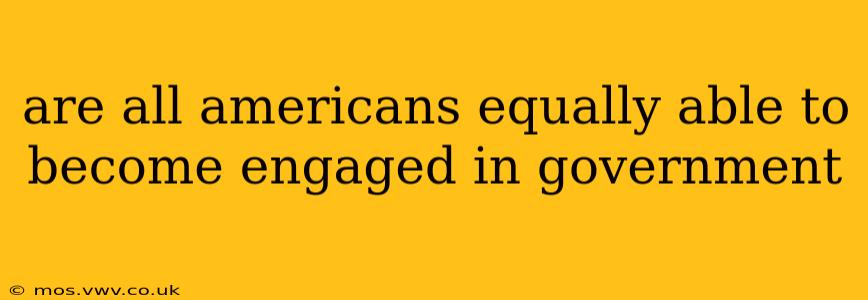Are All Americans Equally Able to Become Engaged in Government?
The ideal of American democracy rests on the principle of equal participation. However, the reality of whether all Americans are equally able to engage in government is complex and multifaceted. While the legal framework ensures equal rights, systemic inequalities and practical barriers create significant disparities in access and influence.
This essay will explore the various factors influencing engagement, addressing common questions surrounding access and participation in the American political system.
What are the biggest obstacles to political participation for marginalized groups?
Marginalized groups face a confluence of obstacles hindering their full participation in government. These include:
-
Socioeconomic disparities: Lack of financial resources restricts access to information, campaign contributions, and travel for political events. This disproportionately affects low-income individuals and communities, limiting their ability to effectively voice their concerns and participate in political processes.
-
Racial and ethnic discrimination: Historical and ongoing systemic racism creates barriers to political engagement for people of color. This includes voter suppression tactics, gerrymandering, and implicit biases within the political system itself.
-
Language barriers: For non-English speakers, accessing information and participating in political processes can be significantly challenging, especially in areas lacking translation services or multilingual resources.
-
Disabilities: Individuals with disabilities often encounter inaccessible polling places, campaign materials, and political events, hindering their ability to fully participate.
-
Geographic location: Rural communities often face limited access to transportation, internet connectivity, and political resources, making engagement a significant challenge.
How can voter suppression affect political engagement?
Voter suppression tactics actively aim to reduce the participation of specific groups. Examples include restrictive voter ID laws, reduced polling places, purging voter rolls, and aggressive challenges to voter registration. These tactics disproportionately affect marginalized communities, effectively silencing their voices and diminishing their political influence. The result is a less representative government, failing to reflect the will of all its citizens.
What role does education play in political engagement?
Education levels strongly correlate with political participation. Higher levels of education typically lead to increased political knowledge, engagement, and efficacy – the belief that one's actions can make a difference. Conversely, limited access to quality education can significantly hamper political participation, particularly for those from disadvantaged backgrounds.
How can we improve civic engagement for all Americans?
Addressing the inequalities in political participation requires a multi-pronged approach:
-
Addressing socioeconomic disparities: Investing in affordable housing, quality education, and living wages would empower marginalized communities, enhancing their ability to engage politically.
-
Combating voter suppression: Implementing policies that expand voting access, such as automatic voter registration and same-day registration, are crucial steps. Eliminating gerrymandering and ensuring fair representation are also paramount.
-
Promoting civic education: Investing in comprehensive civic education programs from a young age equips citizens with the knowledge and skills to participate effectively. This includes promoting media literacy to combat misinformation and disinformation.
-
Increasing accessibility: Ensuring accessibility for all individuals, including those with disabilities, is essential. This includes accessible polling places, websites, and campaign materials.
-
Encouraging multilingual resources: Providing information and resources in multiple languages ensures that all communities can access critical political information.
The ideal of equal participation in government is fundamental to American democracy. However, achieving this ideal requires active effort to dismantle systemic barriers and create a truly inclusive political system where every voice is heard and valued. Only then can we approach a reality where all Americans are equally able to engage in government.
